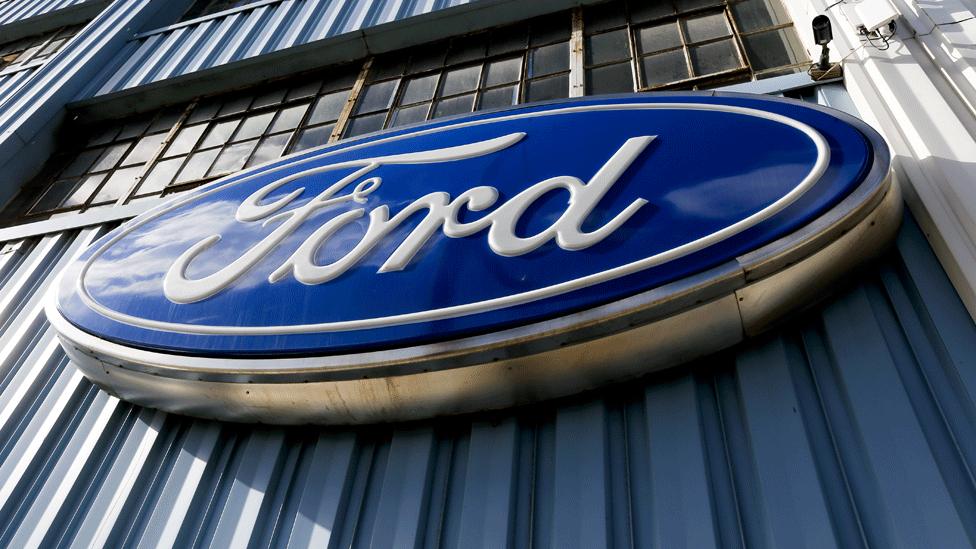Brexit and the bottom line
- Published

The Ford car company says it is concerned about the UK leaving the EU
Ford says a break from the European Union would cost it "hundreds of millions of pounds". That's because it's not only a manufacturer and exporter, but its finance arm is regulated as a bank.
Other motor manufacturers, headquartered in Germany, the US, Japan and India, have also voiced their concern collectively.
Diageo is based in London and the world's biggest spirits company. With 40% of Scotch whisky production, it wants to maintain the existing trade deals - not only with the rest of the EU but the EU's deals with more than 50 other countries.
The English football Premiership wants to stay in Europe. Not to do so would be "incongruous". (Scotland's top flight clubs would be delighted to stay in Europe at least until autumn, but that's another story.)
The business surveys are heavily weighted to support for "remain", backed up by the business organisations, from the CBI to the Scotch Whisky Association to the Scottish Council Development and Industry.
If the vote was down to business turnover or employment clout, there wouldn't be much doubt about the outcome.
But of course, business doesn't have a vote. Individuals do. Business leaders hope their status will carry some weight in persuading people what is in the wider economy's best interests.
And with both higher stakes and a much closer fought campaign, they have been more willing to mix it in this political battle than they were in Scotland two years ago.
There is a vocal minority making the case for "leave". JCB's chairman, Lord Bamford, is an enthusiast for Brexit, telling his staff Britain is "confident that we can stand on our own two feet".
The letter is framed in terms of "sovereignty and regaining control of how we trade with Europe and the world... there is very little to fear if we do choose to leave".
Inventor entrepreneur Sir James Dyson thinks likewise. Wetherspoon's is a major purveyor of beer and pub meals to the heart and stomach of middle Britain, and its boss, Tim Martin, is vociferously against the European Union.
Smaller companies tend to be less inclined to support continued membership of the EU. They are much more numerous - 99% of businesses, but 33% of turnover, while large companies account for only 1 in 1,000 firms in Britain, and more than half of turnover.
The Federation of Small Businesses has a strong element for "Leave". A survey carried out last year, with a healthy sample of membership, found the English FSB vote was only narrowly in favour of staying in the EU, by 45 to 43%. Those in Scotland were by far the most positive, with 60% for staying.
The Federation of Master Builders reported a survey of its members last month, that found 80% would vote according to personal beliefs rather than their business interests, not least because they hadn't figured out how their business could be affected.

The Federation of Master Builders found 80% of its members would vote according to personal beliefs rather than their business interests
But the Business for Scotland organisation - a pro-independence lobby group with views uncannily similar to the SNP's - is campaigning for "remain".
While some smaller firms are in long supply chains, most do not trade internationally. And you could assume they are likely to find the hassle of employment law, of rules and regulations, all the more onerous, where managers have to do more multi-tasking.
That said, the debate about Europe has had quite a lot of vague talk of "red tape" from Brussels, but fewer specifics. The problem for those who would wish to see less regulation is that they don't want to look, at least to target voters, like de-regulators and underminers of workers' conditions and consumer standards.
Much of this is assumed from the few companies that have chosen to put their heads above the parapet. A more robust take on business opinion has been compiled by Brad Mackay, a professor at Edinburgh University Business School. , external
He confirms much of what is assumed, but goes into more detail. And he does so while finding some interesting comparisons with the parallel work he carried out ahead of the Scottish independence referendum.
Business attitudes are driven by a small number of factors, according to this research - the location of the headquarters, the ownership structure, the tax regime in which the balance of trade and profits are amassed, and the best places for multi-nationals to invest.
Wider horizons
So, it's no surprise that Ford and Diageo are among those most concerned about the UK leaving the EU.
One is a US-based multi-national giant which has chosen Britain for much of its European operations because it is a bridgehead for the wider market - though rather than welcoming Turkish workers into the EU labour market, it has sent Transit van production from Britain to Turkey.
The other is a London-based global drinks company with its distilling strongly integrated into Britain, its business denominated in sterling, while looking outward to markets in and out of the EU.
JCB, on the other hand, sells its chunky construction site machinery mainly to customers in the UK, US and India, and only 22% of sales to the EU. It has broader horizons than most exporters.
Privately-owned companies have less concern for pleasing shareholders - publicly at least. Where strong personalities have built them up, the business voice can reflect that individuals' views above the commercial interest of the company.

A poll of fishermen across Britain has shown 92% support for Brexit
But commercial interest still counts, and on both sides of the debate.
Wetherspoon's is cited as an example of a company that could benefit from being better able to influence the British government on regulation than the institutions in Brussels.
A poll of fishermen across Britain has shown 92% support for Brexit. That may be down to the unhappy experience of 40 years of Common Fisheries Policy. Or it may be more forward-looking, to the prospect of future gains for those who are still afloat in that industry.
As the survivors in the industry which can claim to have suffered most at the hands of policy decided in Brussels, fishermen can look to Norway and Iceland as non-EU countries which have been better able to protect their fleets
A breakdown of a survey by the British Chambers of Commerce shows 54% for "remain" and 37% for "leave". Among exporters, the split is 59% to 33%.
Of 497 exporters selling only to the EU, the margin is 62% to 31%. The 88 companies in the survey that sell to the rest of the world, beyond the EU, are split 50% to 47% in favour of a Brexit.
Giving their preference for the outcome is one thing. Doing anything about the result is another.
Of 127 multinationals in the British-American business association, 70% said Britain would be a less attractive place to invest if it were outside the EU. But only a tenth of companies taking part in the survey said they would move operations out of the country.
"There appears to be a 10% rule," concludes Brad Mackay. That was the same share of businesses telling him they would move out of Scotland if there were a "yes" to independence in September 2014.
And the professor's experience of studying that campaign in detail is that companies think about the options in a much simpler way than the campaign does. It's about protecting the interests of customers and workers, but above all, of shareholders.
The political messaging can be tricky, and can be misunderstood, but behind it is a cold, hard assessment of how to maximise shareholder value.
So what will companies do if there's a vote to leave the EU this week? The Vote Leave campaign emphasises that British life will go on come Friday morning.
The financial sector has put traders on a night shift to handle volatility in markets, with expectations of currency gyrations. And of course, there's money to be made from volatility.
Acrimony or pragmatism?
Brad Mackay predicts the first response from most businesses will be to wait and see. In line with Vote Leave's reassurance, that doesn't sound too dramatic. But depending how long the waiting goes on, it may not be great for investment either.
Company bosses will be waiting to see how politicians react, in London, the capitals of continental Europe, and perhaps also in Edinburgh.
They will be looking to see if the break-up is acrimonious and protracted, or pragmatic and short, with a favourable outcome for the UK.
Until then, says the Prof, there would be uncertainty, and business doesn't like the sound of that.
On the other hand, any business with experience of Scotland's referendum in 2014 will also be aware that a vote for the status quo does not mean the end of the debate and of the uncertainty.
An inconclusive result, either way - which looks like what we're going to get - could be costly to the British economy.